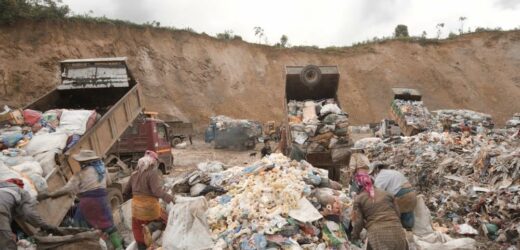In the mesmerizing and strangely beautiful documentary “Matter Out of Place,” which world premieres in International Competition at the Locarno Film Festival on Wednesday, Austrian director Nikolaus Geyrhalter looks at how we dispose of our trash. But, taking a broader view, he is trying to gain a better understanding of mankind, and the impact it is having on the planet, he tells Variety.
The locations for the film are wide ranging: it moves from the mountains of Switzerland to the coasts of Greece and Albania, to an Austrian refuse incinerator, and then to Nepal and the Maldives, and finally to the deserts of Nevada for the Burning Man event.

When choosing locations, sound was as much of a consideration as the images. Geyrhalter says he invested heavily in capturing high-quality surround sound, which is designed to be heard using Dolby Atmos, and then carefully fine tuned the results when it came to sound design and sound mixing during post-production. The sound works hand-in-hand with the cinematography, which was shot using a RED 4K camera. “To tell this kind of story, we need these rather long, wide-angle shots, to make the scenery kind of a stage actually,” Geyrhalter says. Aerial shots are also employed, using drones, but from a fixed position, as if they were a tripod in the air, he says. The overall objective is to immerse the viewer in the environment so they “forget they are sitting in the cinema; they really become part of [the landscape].”
Filming began with Burning Man in 2019, where we see volunteers acting on the event’s philosophy of “Leaving No Trace” by picking up every piece of litter. This was followed by a shoot in Greece, which had to be abandoned when the pandemic struck. A break of almost a year followed until locations began to open up once more. “Production-wise, it was rather complicated, and it took us a year longer than we expected,” Geyrhalter says. The film took over four years to complete, whereas normally it would have taken two to three years.
As with previous films – such as 2019’s “Earth,” winner of the Prize of the Ecumenical Jury at Berlinale Forum, and the International Award at Sheffield Intl. Documentary Festival – the research process did not end once the project had been greenlit, and new locations were being sought as the shoot progressed. However, because of the pandemic, some of the locations they wanted were not accessible, but “we were able to cover all the topics we wanted to cover at alternative locations,” Geyrhalter says.
Geyrhalter’s crews on location are small – with a core team of four to six, including assistant director Sophia Laggner, and a translator and fixer where needed. Geyrhalter produces through his own company, NGF – Nikolaus Geyrhalter Filmproduktion GmbH, which he set up in 1994, with Markus Glaser, Michael Kitzberger and Wolfgang Widerhofer on board as partners since 2003. The company has produced more than 70 documentary feature films and TV documentaries over the past 20 years, winning more than 150 international awards, as well as several TV docu-series. The company’s fiction film “Breaking the Ice,” a queer coming-of-age story set in the world of ice hockey, premiered at Tribeca Film Festival this year.

The cinematography in the film is beautiful, but as it shows garbage blighting the landscape it induces a feeling of sadness. This produces a dissonance, and the viewer feels conflicted. Geyrhalter felt this too as he shot these scenes, but it illustrates his theme: mankind is generating garbage faster than it can dispose of it. “We live on a beautiful planet, but I don’t think that we will find any square meter on the surface of it where you wouldn’t find any kind of trash,” Geyrhalter says. However, the director is not out to preach or deliver a message. “Delivering a message is boring. I think what the audience will do is watch, and think for themselves. They will probably leave the cinema quite thoughtful. And that’s a lot more effective and longer lasting than a filmmaker chatting about his feelings or opinions.”

Geyrhalter has made his film to be viewed in the theater. “The experience in the cinema is unique, and that’s what I make movies for. People will have a chance to watch it in cinemas, but what you can’t avoid is that it will end up on television and on streaming services; and it’s good because it reaches an audience, but if you want the whole experience you’ll have to go to the cinema.”
Geyrhalter has started work on a new project with the working title “Melt,” looking at the places at present covered by snow and ice, but which are shrinking rapidly as climate change takes its toll.
World sales on “Matter Out of Place” are being handled by Autlook Filmsales.
Read More About:
Source: Read Full Article


